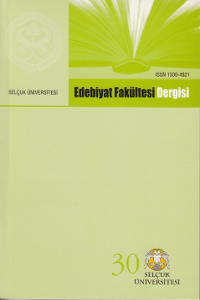Abstract
Bu çalışma, yüzyıllardır Türkiye’de yaşayan, Kafkasya kökenli Abhaz ve Çerkez toplulukların, Türk toplum yapısıyla ne derece bütünleştiğini değerlendirmek amacındadır. Bunun için, sosyo-kültürel yapının unsurları olan, demografik ve aile özellikleri ile ekonomi ve siyaset gibi bazı alanlarda Abhaz ve Çerkezlerin faaliyetleri üzerinde durulmuştur. Göç eden toplulukların, katıldıkları farklı sosyo-kültürel yapılarla ilişkilerini açıklayan kuramlar ile Abhaz ve Çerkezlerin bu kuramlara uygun yönleri değerlendirilmiştir. Ayrıca şehirleşme ve modernleşmenin etkisiyle, bu toplulukların sosyal ve kültürel yapılarında meydana gelen değişmeler üzerinde durulmuştur. Türkiye’de yaşayan Kafkas toplulukları aile yapılarını geleneklerine uygun şekilde sürdürmekle birlikte değişmelerle karşılaşmaktadırlar. Bu topluluklar ekonomik ve siyasi faaliyetlere yoğun şekilde katılmaktadır. Türkiye’de simbiyotik bir ilişki olarak başlayan karşılıklı temas, ekonomik ve siyasi bütünleşmeyle devam etmiştir. Ancak değişimlerden kaynaklanan kültürlerini kaybetme endişesi ve bazı siyasi gelişmeler, bu toplulukların kendilerini Türk toplumu içinde asli unsur görmekten, diaspora olarak görmeye doğru yönelmelerine neden olmaktadır.
Keywords
References
- APPELBAUM, Richard P., (1998), Toplumsal Değişim Kuramları, Ankara: Türkiye İş Bankası Kültür Yayınları.
- ARSLAN, Cahit, (2009), “Türk-Rus-Gürcü İlişkilerinin Merkezindeki Ülke: Abhazya”, Akademik Bakış, Sayı 16, Nisan, ss. 96-107.
- ÇEÇEN, Anıl, (2002), Çeçenistan Dosyası, Ankara: Yeni Avrasya Yayınları.
- ERKAL, Mustafa, (1999), Sosyoloji, İstanbul: Der Yayınları.
- FICHTER, Joseph, (1996), Sosyoloji Nedir?, Ankara: Attila Kitapevi.
- GÜNGÖR, Erol, (1999), Dünden Bugünden, İstanbul: Ötüken Neşriyat.
- GÜVENÇ, Bozkurt, (1991), İnsan ve Kültür, İstanbul: Remzi Yayınları.
- HAVİLAND, William A., (2002), Kültürel Antropoloji, İstanbul: Kaknüs Yayınları.
- HUVAJ, Fahri, (10.05.2004), “Xabze Üzerine”, Kafkas Dernekleri Federasyonu, http://www.kafkasfederasyonu.org/kultursanat/sosyal_yasam/xabze_uzerine.htm.
- HUVAJ, Nejan, (10.05.2004), “Kentleşme, Modernleşme ve Çerkes Gençliği”, Kafkas Dernekleri Federasyonu, http://kafkasfederasyonu.org/genckaffed/2000/kent_modern_cerkes_gencligi_huvaj.htm.
- KAFKAS VAKFI, (8.05.2004), http://www.kafkas.org.tr/belgeler.
- KAYA, Ayhan, (2004 Mart), “Anadolu’daki Kafkasya”, Atlas, Sayı:132, ss. 41-58.
- MERİÇ, Cemil, (1997), Sosyoloji Notları ve Konferanslar, İstanbul: İletişim Yayınları.
- ÖZÖNDER, Cihat, (1998), “Socio-Cultural Aspects of Integration and Disintegration: Turkish Point of View”, Problems Migratoires En Region Mediterraneenne, (Ed. Reiner Biegel), Tunis, ss. 195-204.
- PAPŞU, Murat, (2004 Mart), “Anadolu’daki Abhazya” Atlas, Sayı:132, ss.118-131.
- SHAMİ, Seteney, (10.05.2004), http://www.kaffed.org/index.php/bilgi- belge/diaspora/item/273-urdun.html.
- TEZCAN, Mahmut, (1984), Sosyal ve Kültürel Değişme, Ankara: A.Ü. E.B.F. yayınları no.129.
- TOLAN, Barlas, (1996), Toplum Bilimlerine Giriş, Ankara: Murat ve Adım.
- TURHAN, Mümtaz, (1997), Kültür Değişmeleri, İstanbul: İfav yayınları.
Abstract
This study intends to evaluate to what extent Abhaz and Circassian communities of Caucasus origin, who have lived in Turkey for centuries, have been integrated into the structure of the Turkish society. To this end, elements of socio-cultural structure such as demographic and family features of Abhaz and Circassian people and their activities in areas such as politics and economy have been investigated. Theories explaining the different socio-cultural structures to which migrant communities have joined and the aspects of Abhaz and Circassians that fit these theories have been evaluated. Moreover, changes that have occurred in the social and cultural structures of these communities as a result of the urbanization and modernization have been dwelt upon. Although the Caucasian communities living in Turkey continue their family structures in accordance with their traditions, changes are also encountered. These communities take an active part in economic and social activities. The mutual contact that began as a symbiotic relationship in Turkey continued with economic and political integration. However, their concerns about losing their culture arising from changes and some political developments cause these communities to see themselves as Diaspora within the Turkish community rather than a fundamental element.
Keywords
Caucasian Abhaz Circassian integration assimilation diaspora
References
- APPELBAUM, Richard P., (1998), Toplumsal Değişim Kuramları, Ankara: Türkiye İş Bankası Kültür Yayınları.
- ARSLAN, Cahit, (2009), “Türk-Rus-Gürcü İlişkilerinin Merkezindeki Ülke: Abhazya”, Akademik Bakış, Sayı 16, Nisan, ss. 96-107.
- ÇEÇEN, Anıl, (2002), Çeçenistan Dosyası, Ankara: Yeni Avrasya Yayınları.
- ERKAL, Mustafa, (1999), Sosyoloji, İstanbul: Der Yayınları.
- FICHTER, Joseph, (1996), Sosyoloji Nedir?, Ankara: Attila Kitapevi.
- GÜNGÖR, Erol, (1999), Dünden Bugünden, İstanbul: Ötüken Neşriyat.
- GÜVENÇ, Bozkurt, (1991), İnsan ve Kültür, İstanbul: Remzi Yayınları.
- HAVİLAND, William A., (2002), Kültürel Antropoloji, İstanbul: Kaknüs Yayınları.
- HUVAJ, Fahri, (10.05.2004), “Xabze Üzerine”, Kafkas Dernekleri Federasyonu, http://www.kafkasfederasyonu.org/kultursanat/sosyal_yasam/xabze_uzerine.htm.
- HUVAJ, Nejan, (10.05.2004), “Kentleşme, Modernleşme ve Çerkes Gençliği”, Kafkas Dernekleri Federasyonu, http://kafkasfederasyonu.org/genckaffed/2000/kent_modern_cerkes_gencligi_huvaj.htm.
- KAFKAS VAKFI, (8.05.2004), http://www.kafkas.org.tr/belgeler.
- KAYA, Ayhan, (2004 Mart), “Anadolu’daki Kafkasya”, Atlas, Sayı:132, ss. 41-58.
- MERİÇ, Cemil, (1997), Sosyoloji Notları ve Konferanslar, İstanbul: İletişim Yayınları.
- ÖZÖNDER, Cihat, (1998), “Socio-Cultural Aspects of Integration and Disintegration: Turkish Point of View”, Problems Migratoires En Region Mediterraneenne, (Ed. Reiner Biegel), Tunis, ss. 195-204.
- PAPŞU, Murat, (2004 Mart), “Anadolu’daki Abhazya” Atlas, Sayı:132, ss.118-131.
- SHAMİ, Seteney, (10.05.2004), http://www.kaffed.org/index.php/bilgi- belge/diaspora/item/273-urdun.html.
- TEZCAN, Mahmut, (1984), Sosyal ve Kültürel Değişme, Ankara: A.Ü. E.B.F. yayınları no.129.
- TOLAN, Barlas, (1996), Toplum Bilimlerine Giriş, Ankara: Murat ve Adım.
- TURHAN, Mümtaz, (1997), Kültür Değişmeleri, İstanbul: İfav yayınları.
Details
| Primary Language | Turkish |
|---|---|
| Subjects | Archaeology |
| Journal Section | Articles |
| Authors | |
| Publication Date | February 13, 2015 |
| Submission Date | February 13, 2016 |
| Published in Issue | Year 2013 Issue: 30 |
Selcuk University Journal of Faculty of Letters will start accepting articles for 2025 issues on Dergipark as of September 15, 2024.


